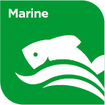Marine

The Marine topic was introduced to Eco-Schools Northern Ireland in 2019. Schools look at all aspects of our diverse marine environment: what lives in our seas, why is it important to us, what threatens it and how can we help protect it.
This topic can be enjoyed by all schools not just those close to the coast. Did you know in Northern Ireland you are never more than 35 miles from sea? Much of our cultural identity comes from being an island nation. All the water on the planet is connected and part of one big water cycle.
Schools are invited to investigate water courses from source to sea. What goes down our drains and into our rivers can end up in the sea to the detriment of life there. Even upstream and in your own home or school the actions you take have an impact on our marine environment. Together let’s create positive actions and positive impacts.
Why is the marine environment so important?
The oceans cover 70% of the planet and are vitally important to all life on earth. They provide us with 50% of our oxygen and are home to a wide range of creatures from very small phytoplankton to the largest mammal on earth - the blue whale. They also provide us with food, other resources and recreation. In short they are an important part of the entire eco-system which supports life on Earth.
We have explored only around 5% of the ocean and the deepest parts have been visited by less humans than the moon. Who knows what we have yet to discover.
Threats to the marine environment
Threats to the marine environment come in many forms but unfortunately often have one common source – humans.
Marine litter
Marine litter is any man-made material that has ended up in the marine environment after being lost or discarded at sea or on land. The term “marine litter” covers a range of materials which have been deliberately discarded, or accidentally lost on shore or at sea. It also includes materials that are carried out to sea from land, rivers, drainage and sewage systems, or by the wind. Discarded fishing gear can entangle or choke marine life.
Did you know it is estimated that each year at least 8 million tonnes of plastics leak into our oceans? This is the same as dumping one refuse truck into the ocean every minute. 80% of litter washed up on our beaches is plastic. Plastic causes catastrophic damage because it does not biodegrade; it breaks down into smaller and smaller pieces and is ingested by marine life of all sizes, even tiny plankton at the bottom of the food chain.
Plastic often kills the sea-life that tries to eat it; filling the stomach of animals so they feel full, leading to starvation or blocked/choked digestive systems. This is a global problem reflected here in our own waters. Dead fulmars washed up on North Sea shores were found to have on average 34 pieces of plastic in their digestive system.
There are also other pollution issues caused from shipping, industrial, agricultural and sewage run off, and even sunscreen.
Climate Change
The oceans help soak up energy (heat) and distribute it more evenly around the earth. They also soak up carbon dioxide (CO2) and have been responsible for slowing down the warming of the planet caused by man-made CO2 emissions.
Absorbing our energy has the side effect of marine life having to adapt to warming ocean temperatures which can cause problems. Absorbing CO2 unfortunately also has the effect of making our oceans more acidic which is very detrimental to the creatures living there – particularly shellfish and coral. As global temperatures rise so do sea levels which cause problems for 2.4 billion humans who live in coastal areas – 40% of the Earth’s population.
Overfishing
Over-fishing occurs when fish are harvested in such large numbers that the population cannot be maintained. It is estimated that 29% of global fish stocks are over-fished. In 40 years 39% of the world’s fish stocks have disappeared.
What can schools do?
-
Raise awareness of the wonders of our marine environment and why the ocean is so important to life on Earth.
- Investigate plastic pollution issues and run a campaign to reduce plastic use in your school, local community and at home with a particular focus on banning single use plastic.
- Clean up your local area, river or coastline. Shout about it and get the local community involved in your actions.
- Take climate action: plant trees, reduce carbon emission by reducing energy and transport use, write to your MLA demanding Climate Action.
- Be aware of over-fishing issues and pledge to eat only sustainable fish in school and at home. Investigate at your local supermarket – is the fish there sustainably sourced?
There is a wealth of resources to help you tackle this topic including the Eco-Schools Marine Topic resource. Other good places to look for inspiration are Plastic Oceans, Ulster Wildlife, Think before you Flush.
